Cloudy water blocking the view of your fish?
Want crystal clear water?
A water clarifier might be the exact product you are looking for.
A few drops is all it takes to see visibly clearer water in just a few days!
Want to know more? Today, I am going to teach you everything you need to know about water clarifiers.
Contents
What is a water clarifier and how does it work?
You see that cloudy water in your aquarium?
It may surprise you to learn that the cloud is actually made up of millions of tiny particles.
These particles could be anything – algae, dust, sediment, tiny pieces of uneaten fish food.
Why doesn’t your filter remove these particles from your aquarium?
Well, these particles are tiny. Really tiny. In fact, if you take a single particle and place it on your finger, you wouldn’t be able to see it.
It’s this small size that is the problem. You see, these particles just slip right by your filter.
But if they were bigger, your filter could trap them, right?
That is the idea behind a water clarifier…
A water clarifier is a chemical in a bottle, and as the name suggests, its job is to make your aquarium crystal clear. Add a few drops to your aquarium, and the water clarifier immediately begins to work its magic…
To put it simply, when you add a water clarifier to your aquarium, it makes any particles floating around your water sticky. As the tiny particles bump into each other, they glue together – forming a clump.
Think of it as rolling a snowball down a hill. It might start off tiny, but it quickly grows in size as more and more snow sticks to the ball.
Eventually, the clumps of particles become large enough that they can no longer pass through your mechanical filter.
This is easy to understand with a diagram.
Pretty simple, huh?
Water clarifiers work instantly, and you should notice sparkling clear water in just 72 hours.
Now that your filter can remove these particles, your water will look visibly clearer. And, it’s all thanks to the water clarifier.
What does (and doesn’t) a water clarifier work on?
While a water clarifier is an effective solution for cloudy water, it is by no means a silver bullet.
My experience is that a water clarifier typically works best on organic substances. What are organic substances? Sand, dirt, plants – including algae.
Any of the above will happily clump together when exposed to a water clarifier.
But you know what it doesn’t work so well on? Bacteria.
If you have just cycled your new aquarium, then a cloudy bacterial bloom is a common sight. Unfortunately, many beginners attempt to get rid of it using a water clarifier since it claims on the bottle to “clear cloudy water.”
When it doesn’t work, they blame the water clarifier for not doing what it claimed.
Fortunately, bacterial blooms go away without any effort on your part. But if you really want to speed up the process, a UV sterilizer is the way to go.
I would also add that if your water has turned brown and murky due to neglect, no amount of water clarifier is going to save your tank. Go back and get the basics right!
Are water clarifiers harmful to your fish?
You don’t have to go far to find stories of people who added water clarifier to their aquarium only to wake up the next morning and find that all their fish were dead.
Unfortunately, these are just that – stories.
However, I can recall two personal experiences from my 30 years of fishkeeping, starting with my former neighbor.
My previous neighbor was a beginner hobbyist, and a lazy one at that. He had an overstocked tank, rarely performed water changes and the less said about his filter, the better. His aquarium was more like a torture chamber than a home for fish.
Not wanting to see his fish suffer, I had been over a few times to test his aquarium and maintain it for him. My test kit often revealed shockingly high levels of ammonia.
Anyway… long story short – he added a water clarifier only to find that a week later that all his fish had died. Now to me, given the state of his tank, I was amazed it took this long to happen.
But to him, it came as a total surprise. He thought back to the last product he added to the aquarium and immediately blamed that – the water clarifier.
Another experience was at my son’s school. An aquarium was donated to the school, and I regularly maintained it because I had all the equipment and skills – it was my way of giving back.
At one point, the aquarium turned cloudy. Rather than wait for me, the teacher went out and bought a bottle of water clarifier. She added it to the tank and within days, all the fish died.
The problem? The school had soft water. This water conditioner said that you should use half the dosage if you add it to soft water. The teacher, not knowing any better, added a full dose and then some.
Now, I’m not saying that everyone who claims a water clarifier killed their fish did something wrong. But at the time of writing this, there isn’t any hard evidence to state that a water clarifier will harm your fish because it hasn’t been widely studied.
I’m not going to outright say that it won’t kill your fish, but claims that it will are in the minority. Thousands of reviews across the web preach the effectiveness of water clarifiers.
I would also add that some brands boldly claim that their water clarifier is safe for fish, going so far as to print this statement in large print on the front of their bottle.
If you are going to use a water clarifier, follow the instructions to the letter and wait at least 48 hours after using other chemical products, such as medications or water conditioners.
What to do after using a water clarifier
Now that your aquarium water is no longer hazy, there are a few final steps:
1. Check your filter
Most of those clumped particles are going to be trapped by your filter.
So, take a glance at your filter media, and if it looks excessively dirty, give it a good rinse. Don’t forget to use dechlorinated water when doing this, or you’ll kill the beneficial bacteria in your filter.
2. Gravel vacuum
The rest of the particles that clump together will fall to the bottom of your aquarium.
So, grab your gravel vac and give your substrate a good going over.
Need a good gravel vac? Check out our best gravel vacuum guide where we test and review over 40 different models.
3. Wait…
If your cloudy water doesn’t return, then that’s all there is to do.
But if your cloudy water returns, you’ll want to figure out why. If you don’t, you’ll constantly need to buy a water clarifier just to keep your aquarium looking clear.
This is perhaps my biggest complaint about using water clarifiers – many beginners use it to hide the cloudy water rather than solve the problem. That cloudy water is there for a reason and is a clue that something isn’t right in your tank.
It’s like taking pain killers if you have a broken leg. Sure, it will help for a bit, but you still have that broken leg once the pain killers wear off.
So, if you find your cloudy water coming back time and time again, it’s time to put on your detective hat and start investigating.
If your tank is in perfect order, then you won’t need a water clarifier in the first place.
Why did my water clarifier make my aquarium even cloudier?
Water clarifiers have one job – to make the water in your aquarium crystal clear.
If you have never used a water clarifier before, then you might panic if it actually makes your water look cloudier. Don’t worry, I did the same the first time I used it!
If you stop to think about it, it actually makes sense.
As the particles clump together, they become larger and more visible. This gives the appearance that your cloudy water is actually worse than before.
Unfortunately, this is just a part of the clarification process. So sit tight… Things are going to look worse before they get better.
The only exception is if you add too much water clarifier.
If this is the case, your water clarifier is going to go on a clumping spree and will very likely turn your water a cloudy brown color.
If you use one of our top picks, an overdose should be harmless and sort itself out in a few days. Just go easy next time, okay?
Speaking of our top picks…
The best water clarifiers for freshwater and saltwater aquariums
If you want to attack that cloudy water quickly, then it’s important that you choose a good one.
Below are two of the best performing aquarium water clarifiers on the market, leaving you with crystal clear water.
The best water clarifier for freshwater aquariums – Acurel F
Acurel has made water clarifiers for over 45 years, and their freshwater aquarium clarifier is second to none. Available in a variety of sizes, this clarifier is capable of treating up to 2,650 gallons of water.
Best of all, it’s organic and made right here in the USA. And, it’s my top pick if you want your freshwater aquarium to sparkle.
If you follow the instructions, then Acurel F is your ticket to clear water.
Let me repeat that. Follow the instructions.
Before using this product, I highly recommend ensuring that you have adequate aeration in your tank – surface agitation is important. If you don’t, keep an eye on your fish, and if you notice them gasping for oxygen, perform an immediate water change.
When used correctly, Acurel F is safe for freshwater fish and plants. It works so well that I wish they made a saltwater version.
The best water clarifier for saltwater aquariums – Kent Marine Tank Clarifier
With so many different particles, algae and dinoflagellates floating through your saltwater aquarium, the thought of adding a water clarifier likely makes your stomach churn.
If you have to go down the water clarifier route, then Kent Marine Tank Clarifier is as good as it gets.
Safe for your corals, anemones and whatever else is hiding in your reef, this water clarifier only clumps together the unwanted gunk that is floating around your aquarium, leaving you with noticeably clearer water.
And don’t worry, it doesn’t contain any nitrates and phosphates – many aquarists use this water clarifier as part of their regular maintenance schedule.
As always, when adding any chemical to your tank, follow the instructions closely and keep an eye on your water parameters!
Conclusion
Water clarifiers are a quick and affordable solution to some causes of cloudy water, particularly sediments and loose sand.
But it’s only a temporary one!
If you don’t fix the cause of your cloudy water, you will be stuck in a cycle of consistently adding a water clarifier every time it returns.
I highly recommend fixing the problem and only using a water clarifier as a last resort.
If you are looking for other products to fix your cloudy water problem, I personally recommend a fine filter media like a polishing pad for physical objects like sand or a UV sterilizer for living things like bacterial bloom or algae that turn your water green.
Do you use water clarifier in your aquarium? Let me know in the comments below!

Ian Sterling, founder of Fishlab.com, began his aquarium journey over 30 years ago, driven by a deep fascination for fish and their diverse personalities. His website, Fishlab.com, is dedicated to making fishkeeping accessible and enjoyable, offering beginner-friendly guidance, expert insights, and a community for aquarists to connect and share experiences.


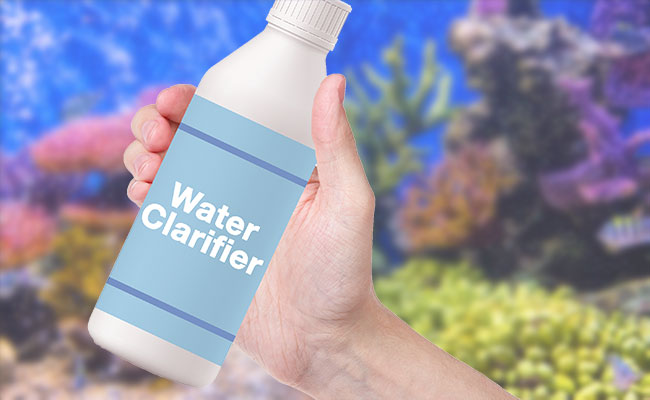
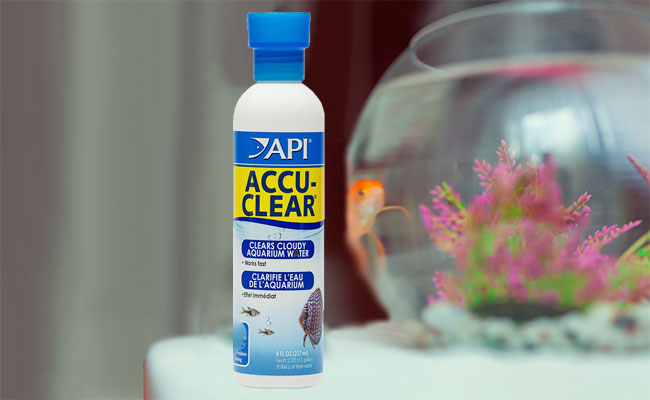
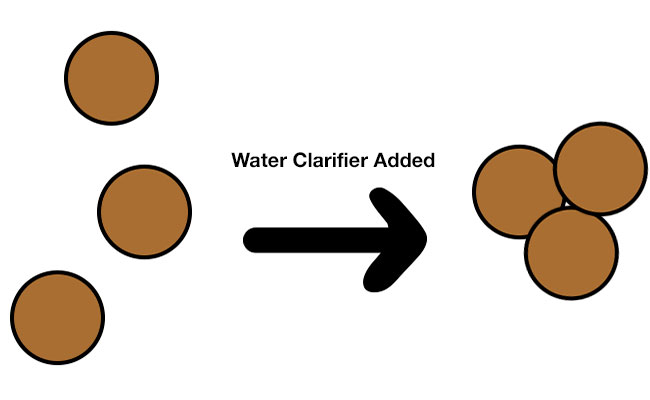
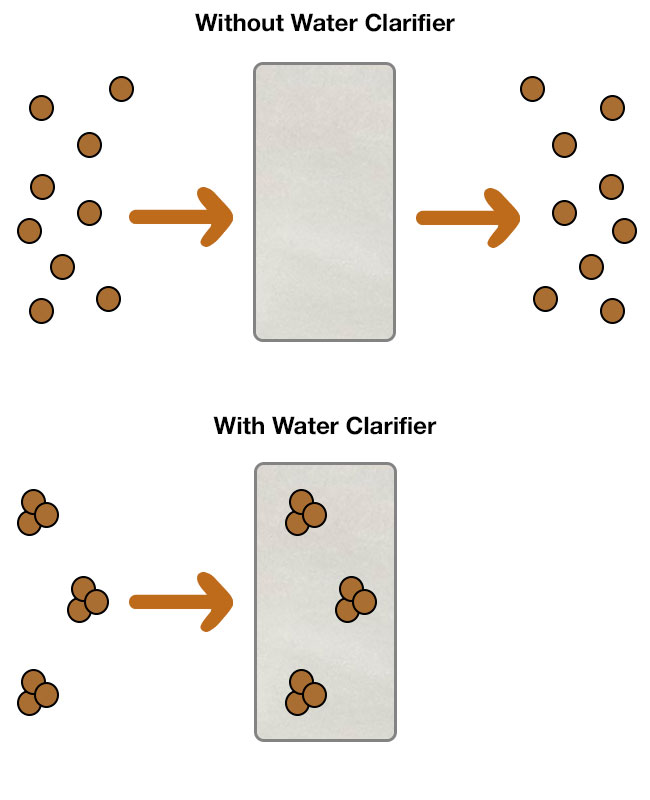
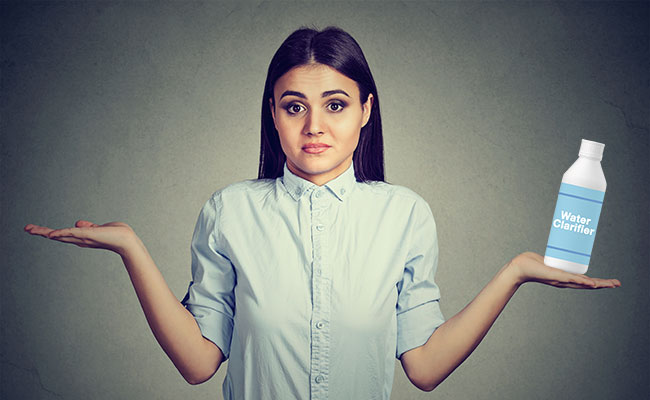
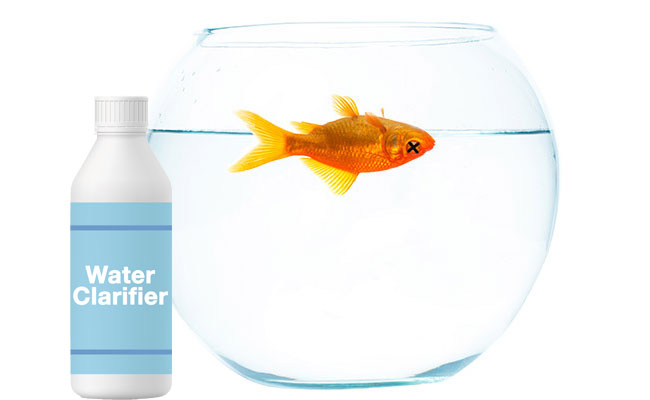
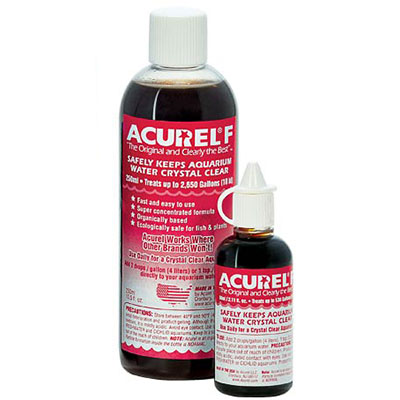
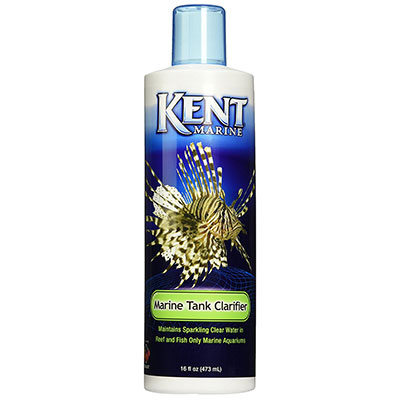
Comments (21)
Is it okay to use water clarifier one day and then follow up a couple days later with more clarifier if it’s still cloudy? Is it possible to use too much clarifier?
Hi Aaron,
If your water has a recurring cloudiness problem, I would try figure out what the source is rather than relying on repeatedly dosing the tank with chemicals. If you instead want to constantly use clarifier, I would only dose as per the instructions.
Can you use Algae fix with clarity at the same time? We have a huge algae problem that i think was caused by 2 lights being left on in the tank.
Hi Lynn,
You would have to reach out to the manufacturers, I have never mixed these two chemicals before.
I rarely use a clarifier, but when I have I have found that the clarifier actually reduces my filters flow by gunking up the pads. Even after rinsing them, the flow is still reduced. Changing out the pads completely fixes the flow issue.
I have a 60’x120′ pond that is 2″ deep on one end and 6′ deep on the other. The water flows in and out continually. I have carp and water snakes. Will a pool clarifier work and not kill fish?
Hi Diane,
I can’t comment on this particular product but I wouldn’t use anything that is marketed for pools in a freshwater pond.
If I used too much accuclear is it a good idea to put my clawed frogs in a quarantine tank to ensure their safety? I have never used accuclear and have had these frogs for a year (friends moved and gave me their set up that they had for over a year). One frog died last week and I don’t want it to happen again!
Hi Alyssa,
I’m more of a fish kinda guy and do not have a whole lot of experience with frogs. I’m not sure how they react to water clarifier.
Hi I have a 36 gallon bow front with 4 fish. It has been running for about 1 year. The water went from very clear to foggy in the last 3 weeks. I have live plants and sand substrate. I have been doing 50% water changes daily for the last week water stays less cloudy for a day then back to cloudy. I have 2 tidal 75 hob filters on the tank. any ideas?
Hi Mike, have you read through this article:
https://fishlab.com/cloudy-aquarium-water/
I use API AccuClear and it worked perfectly, first I saw lots of dust after but then after just 10 hrs the water became crystal clear and I used 4 ml any thoughts?
Hi Tom,
Sounds like it was working as intended. As the small grains of dust clump together, they become noticibly visible. This is common with all water clarifiers. Once these clumps get big enough, they are trapped by your filter.
Which UV sterilizer do you recommend to me? Any thoughts? I have a 37 gallon with 4 plants and 2 caves.
Hi Tom,
For a tank of this size, you can’t really go wrong with the Green Killing Machine, they are effective and easy to use. However, like I said in the guide, the ideal is finding the cause of the cloudiness.
I used water clairifier and within an hour my fish were dead and my tank was disgusting.
Hi Amanda,
Without more information, it’s probably something else was at play here. Generally speaking, when dosed correctly, water clarifier shouldn’t harm your fish.
As for the tank being disgusting, as per the article, this is to be expected. It gets worse before it gets better as the gunk clumps together before being large enough to be trapped by your filter.
I cleaned my fish tank about 3 months ago, I was not having problems with cloudy water. But ever since I changed it I cannot get it to stay cleat. I have gone through 3 bottles of clarifier and I change the filter every 2 weeks.What am I doing wrong.
Hi Kim,
You should be cleaning your fish tank more than once every three months. Your water testing kit will likely clue you in as to what the problem is.
Hello,
This is the first time I have ever left a comment on someone’s post here. I appreciate all the questions and feed back I see. I was wondering if this is ok to use with live plants such as ferns bamboo and moss balls? I have two Oscar’s & 3 picasimus. I am not sure why my water is so cloudy. I might have food debris and maybe some dying leaves? If I clean the tank again and possibly add this to without taking the plants out would it so me more harm than justice? Thanks for your time.
Hi Lisa,
As always, I recommend attacking the cause rather than using water clarifier, reduce feedings, increase maintenance etc. However, it shouldn’t harm plants in any way.